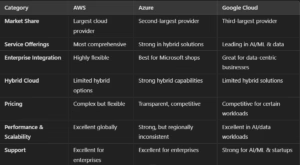Clouds: AWS, Azure, and Google Cloud Face-Off!
In the world of cloud computing, three titans dominate the market: Amazon Web Services (AWS), Microsoft Azure, and Google Cloud. Each of these platforms has carved out a significant piece of the cloud pie, and their rivalry is intensifying as businesses around the globe continue to adopt cloud technologies. But with so many options available, how do these cloud giants compare? Which one should your company choose?

1. Amazon Web Services (AWS): The Pioneer and Leader
Amazon Web Services, the first major player to enter the cloud market, has long held the crown as the largest cloud service provider in the world. Since its launch in 2006, AWS has led the charge in cloud infrastructure services, helping companies transition to the cloud with its vast array of solutions, from computing and storage to machine learning and artificial intelligence.
Strengths:
- Market Leadership: AWS is the market leader in cloud infrastructure, with the largest share of the cloud market. Its wide range of services, robust infrastructure, and extensive global presence make it a top choice for enterprises worldwide.
- Comprehensive Service Offerings: AWS offers an unparalleled breadth of services, including computing (EC2), storage (S3), databases (RDS), machine learning (SageMaker), and much more. It’s a one-stop shop for cloud computing needs.
- Maturity and Reliability: AWS has been around the longest, which means it has had time to refine its offerings, scale globally, and build a solid reputation for reliability. Companies like Netflix, Airbnb, and Uber trust AWS for mission-critical workloads.
Weaknesses:
- Complex Pricing: AWS’s pricing model can be confusing for newcomers, especially when it comes to its pay-as-you-go approach. For businesses with fluctuating usage patterns, managing costs on AWS can become a challenge.
- Steep Learning Curve: Given its massive service catalog, AWS can be overwhelming to navigate, especially for small teams or startups without dedicated cloud expertise.
Best for: Large enterprises, businesses requiring extensive cloud services, and organizations that need maximum flexibility and scalability.
2. Microsoft Azure: The Enterprise Favorite
Microsoft Azure is one of the most popular cloud platforms in the world, especially in the enterprise space. Leveraging Microsoft’s extensive ecosystem of products, Azure offers a seamless experience for companies already using Microsoft tools like Windows Server, Office 365, and Active Directory.
Strengths:
- Enterprise Integration: Azure integrates perfectly with existing Microsoft enterprise products. If your business already uses Windows-based systems, Office 365, or Microsoft SQL Server, Azure is an obvious choice because it provides a cohesive and familiar environment.
- Hybrid Cloud Solutions: Azure excels in hybrid cloud scenarios, offering businesses the ability to run workloads across on-premises, private cloud, and public cloud environments. The platform’s hybrid solutions, like Azure Arc, allow enterprises to maintain control while tapping into the power of the cloud.
- Enterprise Support: Microsoft’s strong presence in enterprise IT environments gives Azure a competitive edge, with dedicated support for large-scale organizations and a range of enterprise-specific tools.
Weaknesses:
- Less Flexible Than AWS: While Azure is highly integrated with Microsoft products, it can be less flexible than AWS for companies that require a broader range of cloud solutions or are looking to run multi-cloud environments.
- Performance Issues in Some Regions: Some users report inconsistent performance in specific geographic regions, especially when compared to AWS’s global footprint.
Best for: Enterprises heavily invested in Microsoft technologies, businesses looking for hybrid cloud solutions, and those in regulated industries that require strong compliance support.
3. Google Cloud: The Innovator in AI and Big Data
Google Cloud may not have the same market share as AWS or Azure, but it’s carving out a strong niche, particularly in the fields of artificial intelligence (AI), machine learning, and big data analytics. With its vast data centers and cutting-edge technologies, Google Cloud is increasingly becoming the go-to platform for companies focused on innovation.
Strengths:
- AI and Machine Learning Expertise: Google has been a pioneer in AI and machine learning, and Google Cloud offers powerful tools and frameworks like TensorFlow, AutoML, and BigQuery to help businesses build and deploy machine learning models quickly and efficiently.
- Big Data Analytics: Google Cloud is known for its strengths in big data and analytics, especially with tools like BigQuery, which allows companies to run high-speed queries on massive datasets. Google’s cloud-native data analytics capabilities set it apart from other providers.
- Global Network Infrastructure: With Google’s global network backbone, Google Cloud customers benefit from low-latency access to data, fast content delivery, and reliable performance across the globe.
Weaknesses:
- More Minimal Ecosystem: While Google Cloud offers a fantastic array of services in certain areas, its ecosystem is more miniature compared to AWS and Azure, particularly when it comes to enterprise-grade offerings.
- Enterprise Adoption: Google Cloud is still working to gain the trust of larger enterprises, and its track record in the enterprise market is less established than AWS or Azure.
Best for: Data-driven businesses, startups, and companies heavily invested in machine learning, AI, and big data analytics.
Comparing the Big Three
When it comes to choosing the best cloud platform, the decision often comes down to the specific needs of your business. Here’s a quick comparison of AWS, Azure, and Google Cloud across key areas:

Which Cloud Should You Choose?
There’s no one-size-fits-all answer to this question. Each cloud provider offers unique strengths that appeal to different types of businesses.
- If you need flexibility and scalability for a wide range of services, AWS is your best bet.
- If your organization is already heavily invested in Microsoft products and you’re looking for hybrid cloud solutions, Azure will seamlessly integrate with your existing tech stack.
- If you’re focused on cutting-edge AI, machine learning, or big data analytics, Google Cloud offers some of the most powerful tools in these areas.
Ultimately, the choice between AWS, Azure, and Google Cloud will depend on your business’s goals, technology stack, and the services that align best with your needs.
Conclusion
The battle between AWS, Azure, and Google Cloud is heating up, and each provider has its own set of strengths and weaknesses. AWS continues to dominate the market with its massive infrastructure and service breadth, Azure remains the top choice for enterprises, and Google Cloud is pushing boundaries with AI and data analytics.
As businesses continue to migrate to the cloud and adopt more advanced technologies, choosing the right cloud provider will be a critical decision that requires careful consideration of your unique needs. Whether you go with the tried-and-true leader, AWS, the enterprise favorite, Azure, or the innovative challenger, Google Cloud, each platform has something valuable to offer in the rapidly evolving world of cloud computing.
